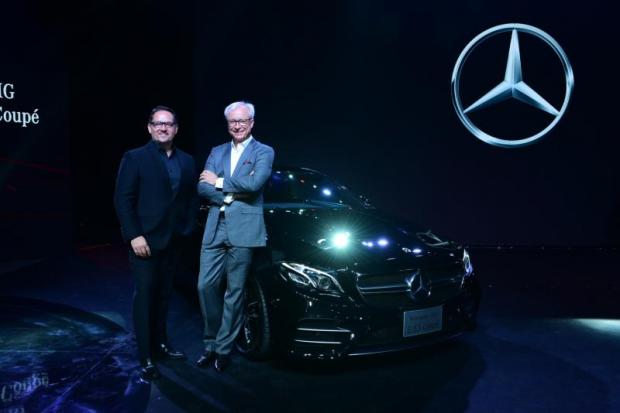
Mercedes-Benz Thailand aims to start local manufacturing of electric vehicles (EVs) after already completing its application for Board of Investment (BoI) incentives covering all global EV line-ups: plug-in hybrid EVs, battery EVs and lithium-ion batteries.
Frank Steinacher, vice-president for sales and marketing, said Mercedes-Benz submitted the application to assemble battery EVs locally. The submission period ended on Dec 28.
In early 2018, Mercedes-Benz applied for manufacturing expansion of plug-in hybrid EVs (worth 607 million baht) while a local partner, Thonburi Automotive Assembly Plant (TAAP), submitted an application for lithium-ion battery production (600 million baht).
Both projects were granted BoI privileges last March at the German car maker's facilities in Samut Prakan province.
"We have begun marketing our plug-in hybrid EVs in the market and have invested further to produce lithium-ion batteries, so it would not make any sense if we did not bring our battery EV technology to the country," Mr Steinacher said.
In early 2016, Mercedes-Benz decided to localise its assembly line of plug-in hybrid EVs and phased out its former technology, Bluetec Hybrid, assembled locally during 2013-15.
In 2017, the government announced the EV scheme and Mercedes-Benz joined the programme.
Last March, Stuttgart-based parent firm Daimler AG localised assembly of batteries for plug-in hybrid EVs at its Samut Prakan plant with an investment of €100 million (3.9 billion baht).
Mercedes-Benz became the first car brand to produce batteries locally.
Thailand is the sixth battery plant for Daimler worldwide, along with three plants in Germany and one each in the US and China.
Mr Steinacher said Mercedes-Benz will introduce the EQC to the local market this year as the first battery EV sold in Thailand.
Making its world debut last September, the EQC was launched under the EQ Electric Intelligence initiative.
"The EQC comes with the possibility of being assembled locally," he said.
Mercedes-Benz is also emphasising the EQ families of EQ Power (plug-in hybrid EV), EQ Power+ (AMG cars) and EQ Boost (48-volt on-board electric system) in the market.
All three platforms being assembled at the Samut Prakan plant.
Separately, the company reported 2018 set a record for sales with 15,785 vehicles, a 9% rise from the year before.
Mercedes-Benz also laid claim to being the leader in the luxury car market for 18 straight years.
Roland Folger, president and chief executive of Mercedes-Benz Thailand, said the overall luxury car market grew from 27,000 units sold in 2017 to 32,000 in 2018, as each distributor was competitive with new cars and technologies.
"Sixteen models were launched in Thailand last year," Mr Folger said.
Meanwhile, new luxury players have entered the market.
"At least 20 new models are expected to be launched in Thailand in 2019, as well as four new dealers to be nominated, bringing total dealers to 36 by the end of 2019," Mr Folger said.